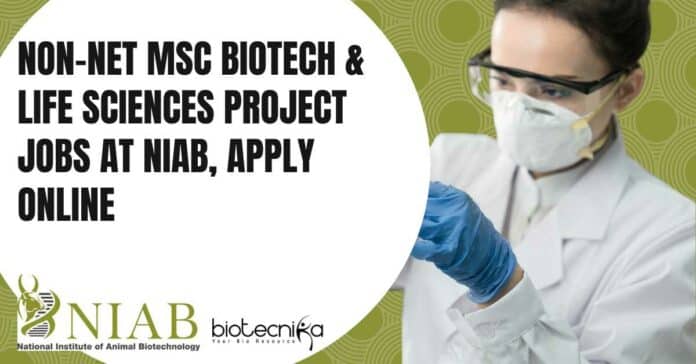NIAB MSc Biotech Project Jobs – MSc Life Sciences Apply Online
NIAB MSc Biotech Project Jobs – MSc Life Sciences Apply Online. National Institute of Animal Biotechnology vacancies. MSc Life Sciences and Biotechnology project jobs. Interested and eligible applicants can check out all of the details on the same below
Don’t forget to check out possible interview questions for this job below
This job expires in
National Institute of Animal Biotechnology, Hyderabad–500032
(An Autonomous Institute of the Department of Biotechnology)
Advertisement No. 16/2023
Applications are invited from suitable candidates for filling up following positions at the National Institute of Animal Biotechnology (NIAB), Hyderabad.
Post I
Name of the Post: Project Associate-I
No. of Posts: 3 Positions
Name of the Project: Socio-economic upliftment of landless and marginal farmers of Yadgir district (an aspirational district) of Karnataka through goat rearing.
Name of the PI: Dr. Pankaj Suman
Tenure upto: December 2023.
Age: 35 years (Relaxation is admissible in case of SC/ST/OBC candidates as per Government instructions)
Fellowship amount: Rs. 31,000 + 24 % HRA as per the DST guidelines.
Eligibility:
a. MSc (Life Sciences/Biotechnology / Veterinary Sciences (MVSc)
b. Non-NET-qualified candidates with postgraduate degrees in the above-mentioned disciplines can also apply; they will be paid as per DST guidelines.
c. Candidates with experience to handle a socio-economic aspect of rural development, animal breeding, livestock management will be given preference.
Post II
Name of the Post: Project Associate-II
No. of Posts: 1 Position
Name of the Project: Nanostructured paper-kit comprising magnetic nanoparticle for naked eye and rapid detection of subclinical and clinical mastitis: optimization for large scale production and clinical validation in field condition.
Name of the PI: Dr. Pankaj Suman
Tenure upto: March 2024
Age: 35 years (Relaxation is admissible in case of SC/ST/OBC candidates as per Government instructions)
Fellowship amount: Rs. 35,000 + 24 % HRA as per the DST guidelines.
Eligibility:
a. MSc (Life Sciences/Biotechnology / Veterinary Sciences (MVSc)
b. Non-NET-qualified candidates with postgraduate degrees in the above-mentioned disciplines can also apply; they will be paid as per DST guidelines.
c. Demonstrated research experience of 2 years in preparation and characterization of nanomaterials, development of in vitro diagnostics.
How to Apply –
Applications are to be filled ONLINE. The online link for submission of the application is available from 24-04-2023 and the last date is 08-05-2023. Candidates must fill online application form at www.niab.res.in. Candidates are advised to fill out the online application form before the last date to avoid last-minute technical issues. Suitable candidates will be screened, intimated through email, and interviewed by the duly constituted selection committee. Original documents in support of date of birth, educational qualifications, and experience certificates must be submitted at the time of joining.
No need to send a hard copy. Interim enquiries will not be entertained
Check the notification below
💡 Here are a few possible interview questions for the above job posting and their answers.
👍We hope this helps in giving you a rough idea as to how to prepare for the interview for this specific role. Good luck!
- What relevant experience do you have in socio-economic development, animal breeding or livestock management?
Answer: As a Project Associate, I have worked on various projects related to animal breeding and rural development, which have honed my skills in the relevant areas. For instance, in my previous project, I was involved in socio-economic upliftment of farmers through goat rearing, which required me to handle various aspects of goat breeding and management. Additionally, I have also conducted several awareness campaigns for farmers on animal husbandry and livestock management.
- Can you explain the process of developing in vitro diagnostics for mastitis and how you contributed to this process?
Answer: I have worked on several projects related to the development of in vitro diagnostics for various diseases, including mastitis. The process involves the preparation and characterization of nanomaterials, which are then used to develop a paper-kit that can detect subclinical and clinical mastitis. My contribution to this process involved conducting experiments to optimize the production of the paper-kit and validating it in field conditions.
- How do you plan to optimize the production of the paper-kit comprising magnetic nanoparticles for the detection of mastitis?
Answer: To optimize the production of the paper-kit, I plan to conduct further research to identify the optimal conditions for preparing the magnetic nanoparticles. This may involve exploring various techniques, such as chemical precipitation or sol-gel methods, to prepare the nanoparticles. Additionally, I will also explore different types of paper substrates that can enhance the sensitivity and selectivity of the kit.
- What are the key challenges that you foresee in implementing the project on socio-economic upliftment of landless and marginal farmers through goat rearing in Yadgir district of Karnataka?
Answer: Some of the key challenges that I foresee include lack of awareness among farmers about the benefits of goat rearing, limited access to veterinary services and lack of infrastructure for breeding and management of goats. To address these challenges, we plan to conduct awareness campaigns, provide training to farmers on goat rearing and management, and set up veterinary services and infrastructure to support the project.
- What are the potential applications of the paper-kit comprising magnetic nanoparticles, and how do you see this technology being used in the future?
Answer: The paper-kit comprising magnetic nanoparticles has potential applications in the rapid and cost-effective diagnosis of various diseases, including mastitis. This technology can be used in both clinical and field settings, enabling rapid detection and diagnosis of diseases. In the future, this technology can be further optimized to detect other diseases, and its applications can be extended to other areas, such as food safety and environmental monitoring.
Editor’s Note: NIAB MSc Biotech Project Jobs – MSc Life Sciences Apply Online. Please ensure that you are subscribed to the Biotecnika Times Newsletter and our YouTube channel to be notified of all of the latest in the industry. Follow us on all of our social media like Twitter, Telegram, Facebook and Instagram.


























